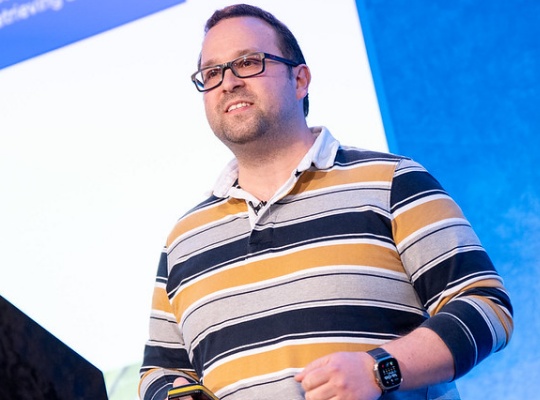Codetown
Codetown ::: a software developer's community
Clojure
Information
Clojure is a programming language that shares the powerful meta-programming facilities of Lisp, has an agent-based approach to concurrency like Erlang, and can use or implement Java libraries.
Website: http://clojure.org
Members: 8
Latest Activity: Feb 13, 2014
Discussion Forum
Howard Lewis Ship on Clojure at GatorJUG
Howard gave a talk about Clojure last night at the GatorJUG. Wow! We all learned so much. Howard used IntelliJ Idea to code on the fly from memory. We saw some sweet functionality and I think we're all excited about learning more. If you missed last…Continue
Started by Michael Levin Feb 13, 2014.
Why Clojure?
My bud Matt Raible blogged about reading a Scala book and I mentioned Stuart Holloway's…Continue
Tags: raible, lavigne, composure, clojure
Started by Michael Levin Jan 16, 2010.
A First Web Project with Clojure 3 Replies
Last nights GatorJUG prestation on Clojure with Eric Lavigne introduced us to Clojure's language elements. Say your customer, a timeshare company, wanted a new database driven reservation website. Build a case for Clojure and lay out a reasonable…Continue
Tags: reservation, system, timeshare, RDBMS, web
Started by Michael Levin. Last reply by Eric Lavigne Jan 16, 2010.
Clojure Reading List
![]() Loading feed
Loading feed
Comment Wall
Comment
-
Comment by Eric Lavigne on February 11, 2009 at 11:36pm
-
Delivered a Clojure presentation for GatorJUG.
Larry Diehl's Clojure presentation for OrlandoJUG will be on February 26. It looks like his presentation will be more thorough, including discussion of multimethods and charting/graphing.
-
Comment by Eric Lavigne on January 4, 2009 at 7:14pm
-
I wrote an article about authentication and authorization in Compojure, in which I show how to create a login form and restrict pages to authorized users.
-
Comment by Eric Lavigne on December 28, 2008 at 3:24am
-
I wrote an article about using PostgreSQL with Compojure, in which I describe setting up PostgreSQL on Ubuntu, adding a PostgreSQL JDBC library to the classpath, retrieving database records with clojure.contrib.sql, and rendering HTML with compojure.html.
-
Comment by Larry Diehl on December 23, 2008 at 9:01pm
-
So far I have found a small number of people interested in it, yes. But, I'm the only person that I know that is programming anything with it at the moment.
Hopefully after the OrlandoJUG presentation I'll be able to gauge interest more accurately.
The number of people that are interested in Orlambda will also affect the kinds of presentations. If a lot of people end up being interested, then the meetings would be slower and more introductory.
But, I think it's more likely that a small group of people (<10) would come at first. If that's the case then it could be more fun because we would be able to assume knowledge after the first couple meetings, and move into more complex and interesting presentations.
-
Comment by Eric Lavigne on December 23, 2008 at 8:53pm
-
Have you found anyone else in Orlando that's interested in Clojure? It's a long drive from Gainesville, but I could probably come for weekend meetings.
-
Comment by Larry Diehl on December 23, 2008 at 8:42pm
-
I should also mention that I'm trying to put together a Clojure users group for Orlando, you can follow that progress here: http://orlambda.ning.com
-
Comment by Larry Diehl on December 23, 2008 at 8:28pm
-
I moved from Ruby to Common Lisp, and now Clojure. In fact, I'll be giving a Clojure presentation in February for the OrlandoJUG :)
-
Comment by Eric Lavigne on December 23, 2008 at 8:04pm
-
Larry, your Cry article makes it look like you miss using Lisp. Why are you using Ruby instead?
-
Comment by Larry Diehl on December 22, 2008 at 7:56pm
-
Hey Eric, saw that on the mailing list. Didn't know you were in Gainesville, I'm down in Orlando.
-
Comment by Eric Lavigne on December 22, 2008 at 6:26pm
-
I wrote an article about setting up Compojure on a Slicehost server.
Notes
Welcome to Codetown!
 Codetown is a social network. It's got blogs, forums, groups, personal pages and more! You might think of Codetown as a funky camper van with lots of compartments for your stuff and a great multimedia system, too! Best of all, Codetown has room for all of your friends.
Codetown is a social network. It's got blogs, forums, groups, personal pages and more! You might think of Codetown as a funky camper van with lots of compartments for your stuff and a great multimedia system, too! Best of all, Codetown has room for all of your friends.
Created by Michael Levin Dec 18, 2008 at 6:56pm. Last updated by Michael Levin May 4, 2018.
Looking for Jobs or Staff?
Check out the Codetown Jobs group.
InfoQ Reading List
MySQL 9.6 Changes Foreign Key Constraints and Cascade Handling

MySQL is changing the way foreign key constraints and cascades are managed. Starting with MySQL 9.6, foreign key validation and cascade actions are handled by the SQL layer rather than the InnoDB storage engine. This will improve change tracking, replication accuracy, and data consistency, making MySQL more reliable for CDC pipelines, mixed-database environments, and analytics workloads.
By Renato LosioVercel Releases React Best Practices Skill with 40+ Performance Rules for AI Agents

Vercel has launched "react-best-practices," an open-source repository featuring 40+ performance optimization rules for React and Next.js apps. Tailored for AI coding agents yet valuable for developers, it categorizes rules based on impact, assisting in enhancing performance, bundle size, and architectural decisions.
By Daniel CurtisKubernetes Introduces Node Readiness Controller to Improve Pod Scheduling Reliability

The Kubernetes project recently announced a new core controller called the Node Readiness Controller, designed to enhance scheduling reliability and cluster health by making the API server’s view of node readiness more accurate.
By Craig RisiPresentation: Platforms for Secure API Connectivity With Architecture as Code

Jim Gough discusses the transition from accidental architect to API program leader, explaining how to manage the complexity of secure API connectivity. He shares the Common Architecture Language Model (CALM), a framework designed to bridge the developer-security gap. By leveraging architecture patterns, engineering leaders can move from six-month review cycles to two-hour automated deployments.
By Jim GoughMicrosoft Open Sources Evals for Agent Interop Starter Kit to Benchmark Enterprise AI Agents

Microsoft's Evals for Agent Interop is an open-source starter kit that enables developers to evaluate AI agents in realistic work scenarios. It features curated scenarios, datasets, and an evaluation harness to assess agent performance across tools like email and calendars.
By Edin Kapić
© 2026 Created by Michael Levin.
Powered by
![]()
You need to be a member of Clojure to add comments!